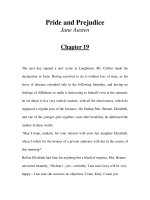pride and predjuce in south pacific
Bạn đang xem bản rút gọn của tài liệu. Xem và tải ngay bản đầy đủ của tài liệu tại đây (27.66 KB, 2 trang )
In Rogers and Hammerstein's South Pacific, the main theme is
racial prejudices. The two main characters, Emile de Becque and Nellie
Forbush are faced with these problems as they attempt a relationship.
Two other minor characters, Lt. Joe Cable and Liat, are faced with the
same dilemma. Both Nellie and Joe Cable have a hard time copping with
their own racial prejudices; Joe loves Liat, yet cannot marry her because
she is Tonkinese ; Nellie loves Emile, but cannot marry him because of
his former Polynesian wife. It is these prejudices that set the state for
what might be the most significant scene in the production. In act 2,
scene 3, Nellie reveals her prejudices to Emile. I can't help it. It isn't as if
I could give you a good reason. There is no reason. This is emotional.
It's something that is born in me. She looks to Cable for help in
describing what she feels, but he offers no help. Emile tells her that it is
not born in her, that it cannot be born in her. Nellie, who is crying, runs
off. Emile is left with Joe, who is thinking over his own relationship with
Liat. Emile asks him why he and Nellie think that these prejudices are
born in them. Joe, giving him the product of his thoughts, tell him "It's not
born in you." It is at this point that Joe Cable begins singing "Carefully
Taught," a character song in which Joe is able to vent his frustrations and
anger about his own prejudices. The music is slightly upbeat, which
helps to illustrate that by singing this song, he is beginning to feel better.
The words that Joe sing tell the audience that he realizes that prejudices
aren't born within someone, but taught to them. You've got to be taught to
be afraidOf people who's eyes are oddly made,And people who's skin is a
different shade -You've got to be carefully taught! To HATE all the
people your relatives hate -You've got to be carefully taught! (II,iii) Joe
realizes that there would be no prejudices in the world if it nobody were to
teach it to the children. He sees that if nobody had even spoken against
other races or people that were different, he would have no problem with
marrying Liat. He realizes that he actually does not feel these things at
all and the ideas that have been planted in his head can be as easily
uprooted as they were planted. Joe, feeling better, sits down and listens
to Emile begin to speak. Emile tells Joe that it was prejudice that he
had been running away from and it was prejudice that had found him
again. He finishes "Carefully Taught". He sings of being cheated in the
past and being cheated out of love again. He sings that it is the fault of "a
MEAN little world of MEAN little men (II,iii)." He sings that he will hold on
to this island "and be free - and alone(II,iii)." It is this part of the song that
offers a perfect segue into Emile's next song, "This Nearly Was Mine."
Joe alludes to the fact that he will probably marry Liat after all by
saying that all he cares about is on the island and so he plans to stay
there. Emile agrees with him that if all you care about is right there on
that spot, then it is a good place to be, but if what you care about is gone,
there is no place to be. It is at this point that he adds his voice to the
music that has been going on under the dialogue, singing "This Nearly
Was Mine", a love song that shows how much Nellie's refusing marriage
has affected him. The song he sings is about things lost and giving up
hope of ever being happy again. He sings of having one love, one girl,
one dream, and each of those things would be in his paradise, which he
nearly had. He poetically sings of how Nellie flew into his heart, only to fly
away. He remembers things like kisses, and time spent with her, but
realizes that these things will be no more. The song is very sad and the
music magnifies that emotion of sadness to a higher degree.After Emile
has finished singing, Joe sees the opportunity to take advantage of the
situation. He asks Emile if he would reconsider going on the spy mission
with him, now that he has nothing to risk losing. Emile agrees and they
set off to tell Captain Brackett that they will be doing the mission after all.
Act 2, scene 3, is a very important scene in South Pacific because
it tackles the problem of social prejudices as well as puts Emile into
danger by sending him off on a mission to spy on the Japanese. The
scene puts forth a social message as well as furthering the plot. It is
because of Emile's acceptance of the mission that helps Nellie realize
that her prejudices are stupid and that she's giving away everything that is
important to her because of someone else's preconceived notions of
people. By examining some of the social problems of the time (and even
now), Act 2, scene 3, proves to be one of the most significant of the
production.









